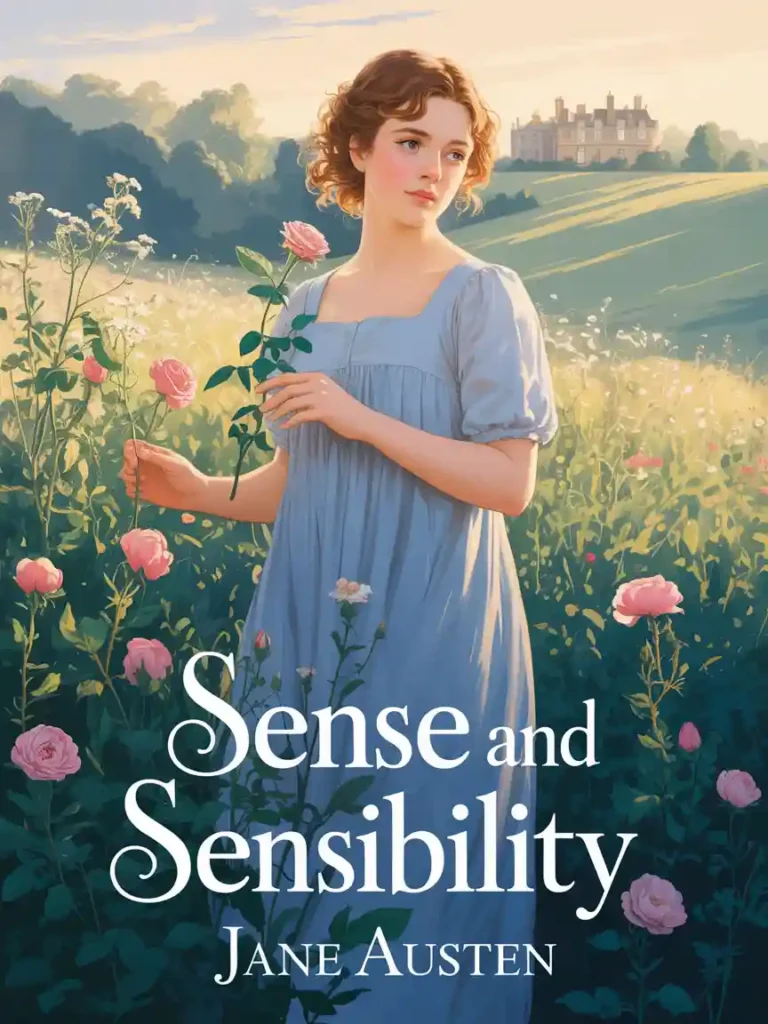CHAPTER XXXI.
From a night of more sleep than she had expected, Marianne awoke the
next morning to the same consciousness of misery in which she had closed
her eyes.
Elinor encouraged her as much as possible to talk of what she felt; and
before breakfast was ready, they had gone through the subject again and
again; and with the same steady conviction and affectionate counsel on
Elinor’s side, the same impetuous feelings and varying opinions on
Marianne’s, as before. Sometimes she could believe Willoughby to be as
unfortunate and as innocent as herself, and at others, lost every consolation
in the impossibility of acquitting him. At one moment she was absolutely
indifferent to the observation of all the world, at another she would seclude
herself from it for ever, and at a third could resist it with energy. In one
thing, however, she was uniform, when it came to the point, in avoiding,
where it was possible, the presence of Mrs. Jennings, and in a determined
silence when obliged to endure it. Her heart was hardened against the belief
of Mrs. Jennings’s entering into her sorrows with any compassion.
“No, no, no, it cannot be,” she cried; “she cannot feel. Her kindness is not
sympathy; her good-nature is not tenderness. All that she wants is gossip,
and she only likes me now because I supply it.”
Elinor had not needed this to be assured of the injustice to which her
sister was often led in her opinion of others, by the irritable refinement of
her own mind, and the too great importance placed by her on the delicacies
of a strong sensibility, and the graces of a polished manner. Like half the
rest of the world, if more than half there be that are clever and good,
Marianne, with excellent abilities and an excellent disposition, was neither
reasonable nor candid. She expected from other people the same opinions
and feelings as her own, and she judged of their motives by the immediate
effect of their actions on herself. Thus a circumstance occurred, while the
sisters were together in their own room after breakfast, which sunk the heart
of Mrs. Jennings still lower in her estimation; because, through her own
weakness, it chanced to prove a source of fresh pain to herself, though Mrs.
Jennings was governed in it by an impulse of the utmost goodwill.
With a letter in her outstretched hand, and countenance gaily smiling,
from the persuasion of bringing comfort, she entered their room, saying,
“Now, my dear, I bring you something that I am sure will do you good.”
Marianne heard enough. In one moment her imagination placed before
her a letter from Willoughby, full of tenderness and contrition, explanatory
of all that had passed, satisfactory, convincing; and instantly followed by
Willoughby himself, rushing eagerly into the room to inforce, at her feet, by
the eloquence of his eyes, the assurances of his letter. The work of one
moment was destroyed by the next. The hand writing of her mother, never
till then unwelcome, was before her; and, in the acuteness of the
disappointment which followed such an ecstasy of more than hope, she felt
as if, till that instant, she had never suffered.
The cruelty of Mrs. Jennings no language, within her reach in her
moments of happiest eloquence, could have expressed; and now she could
reproach her only by the tears which streamed from her eyes with
passionate violence—a reproach, however, so entirely lost on its object, that
after many expressions of pity, she withdrew, still referring her to the letter
of comfort. But the letter, when she was calm enough to read it, brought
little comfort. Willoughby filled every page. Her mother, still confident of
their engagement, and relying as warmly as ever on his constancy, had only
been roused by Elinor’s application, to intreat from Marianne greater
openness towards them both; and this, with such tenderness towards her,
such affection for Willoughby, and such a conviction of their future
happiness in each other, that she wept with agony through the whole of it.
All her impatience to be at home again now returned; her mother was
dearer to her than ever; dearer through the very excess of her mistaken
confidence in Willoughby, and she was wildly urgent to be gone. Elinor,
unable herself to determine whether it were better for Marianne to be in
London or at Barton, offered no counsel of her own except of patience till
their mother’s wishes could be known; and at length she obtained her
sister’s consent to wait for that knowledge.
Mrs. Jennings left them earlier than usual; for she could not be easy till
the Middletons and Palmers were able to grieve as much as herself; and
positively refusing Elinor’s offered attendance, went out alone for the rest
of the morning. Elinor, with a very heavy heart, aware of the pain she was
going to communicate, and perceiving, by Marianne’s letter, how ill she had
succeeded in laying any foundation for it, then sat down to write her mother
an account of what had passed, and entreat her directions for the future;
while Marianne, who came into the drawing-room on Mrs. Jennings’s going
away, remained fixed at the table where Elinor wrote, watching the
advancement of her pen, grieving over her for the hardship of such a task,
and grieving still more fondly over its effect on her mother.
In this manner they had continued about a quarter of an hour, when
Marianne, whose nerves could not then bear any sudden noise, was startled
by a rap at the door.
“Who can this be?” cried Elinor. “So early too! I thought we had been
safe.”
Marianne moved to the window.
“It is Colonel Brandon!” said she, with vexation. “We are never safe from
him.”
“He will not come in, as Mrs. Jennings is from home.”
“I will not trust to that,” retreating to her own room. “A man who has
nothing to do with his own time has no conscience in his intrusion on that
of others.”
The event proved her conjecture right, though it was founded on injustice
and error; for Colonel Brandon did come in; and Elinor, who was convinced
that solicitude for Marianne brought him thither, and who saw that
solicitude in his disturbed and melancholy look, and in his anxious though
brief inquiry after her, could not forgive her sister for esteeming him so
lightly.
“I met Mrs. Jennings in Bond Street,” said he, after the first salutation,
“and she encouraged me to come on; and I was the more easily encouraged,
because I thought it probable that I might find you alone, which I was very
desirous of doing. My object—my wish—my sole wish in desiring it—I
hope, I believe it is—is to be a means of giving comfort;—no, I must not
say comfort—not present comfort—but conviction, lasting conviction to
your sister’s mind. My regard for her, for yourself, for your mother—will
you allow me to prove it, by relating some circumstances which nothing but
a very sincere regard—nothing but an earnest desire of being useful—I
think I am justified—though where so many hours have been spent in
convincing myself that I am right, is there not some reason to fear I may be
wrong?” He stopped.
“I understand you,” said Elinor. “You have something to tell me of Mr.
Willoughby, that will open his character farther. Your telling it will be the
greatest act of friendship that can be shown Marianne. My gratitude will be
insured immediately by any information tending to that end, and hers must
be gained by it in time. Pray, pray let me hear it.”
“You shall; and, to be brief, when I quitted Barton last October,—but this
will give you no idea—I must go farther back. You will find me a very
awkward narrator, Miss Dashwood; I hardly know where to begin. A short
account of myself, I believe, will be necessary, and it shall be a short one.
On such a subject,” sighing heavily, “can I have little temptation to be
diffuse.”
He stopt a moment for recollection, and then, with another sigh, went on.
“You have probably entirely forgotten a conversation—(it is not to be
supposed that it could make any impression on you)—a conversation
between us one evening at Barton Park—it was the evening of a dance—in
which I alluded to a lady I had once known, as resembling, in some
measure, your sister Marianne.”
“Indeed,” answered Elinor, “I have not forgotten it.” He looked pleased
by this remembrance, and added,
“If I am not deceived by the uncertainty, the partiality of tender
recollection, there is a very strong resemblance between them, as well in
mind as person. The same warmth of heart, the same eagerness of fancy and
spirits. This lady was one of my nearest relations, an orphan from her
infancy, and under the guardianship of my father. Our ages were nearly the
same, and from our earliest years we were playfellows and friends. I cannot
remember the time when I did not love Eliza; and my affection for her, as
we grew up, was such, as perhaps, judging from my present forlorn and
cheerless gravity, you might think me incapable of having ever felt. Hers,
for me, was, I believe, fervent as the attachment of your sister to Mr.
Willoughby and it was, though from a different cause, no less unfortunate.
At seventeen she was lost to me for ever. She was married—married against
her inclination to my brother. Her fortune was large, and our family estate
much encumbered. And this, I fear, is all that can be said for the conduct of
one, who was at once her uncle and guardian. My brother did not deserve
her; he did not even love her. I had hoped that her regard for me would
support her under any difficulty, and for some time it did; but at last the
misery of her situation, for she experienced great unkindness, overcame all
her resolution, and though she had promised me that nothing—but how
blindly I relate! I have never told you how this was brought on. We were
within a few hours of eloping together for Scotland. The treachery, or the
folly, of my cousin’s maid betrayed us. I was banished to the house of a
relation far distant, and she was allowed no liberty, no society, no
amusement, till my father’s point was gained. I had depended on her
fortitude too far, and the blow was a severe one—but had her marriage been
happy, so young as I then was, a few months must have reconciled me to it,
or at least I should not have now to lament it. This however was not the
case. My brother had no regard for her; his pleasures were not what they
ought to have been, and from the first he treated her unkindly. The
consequence of this, upon a mind so young, so lively, so inexperienced as
Mrs. Brandon’s, was but too natural. She resigned herself at first to all the
misery of her situation; and happy had it been if she had not lived to
overcome those regrets which the remembrance of me occasioned. But can
we wonder that, with such a husband to provoke inconstancy, and without a
friend to advise or restrain her (for my father lived only a few months after
their marriage, and I was with my regiment in the East Indies) she should
fall? Had I remained in England, perhaps—but I meant to promote the
happiness of both by removing from her for years, and for that purpose had
procured my exchange. The shock which her marriage had given me,” he
continued, in a voice of great agitation, “was of trifling weight—was
nothing to what I felt when I heard, about two years afterwards, of her
divorce. It was that which threw this gloom,—even now the recollection of
what I suffered—”
He could say no more, and rising hastily walked for a few minutes about
the room. Elinor, affected by his relation, and still more by his distress,
could not speak. He saw her concern, and coming to her, took her hand,
pressed it, and kissed it with grateful respect. A few minutes more of silent
exertion enabled him to proceed with composure.
“It was nearly three years after this unhappy period before I returned to
England. My first care, when I did arrive, was of course to seek for her; but
the search was as fruitless as it was melancholy. I could not trace her
beyond her first seducer, and there was every reason to fear that she had
removed from him only to sink deeper in a life of sin. Her legal allowance
was not adequate to her fortune, nor sufficient for her comfortable
maintenance, and I learnt from my brother that the power of receiving it had
been made over some months before to another person. He imagined, and
calmly could he imagine it, that her extravagance, and consequent distress,
had obliged her to dispose of it for some immediate relief. At last, however,
and after I had been six months in England, I did find her. Regard for a
former servant of my own, who had since fallen into misfortune, carried me
to visit him in a spunging-house, where he was confined for debt; and there,
in the same house, under a similar confinement, was my unfortunate sister.
So altered—so faded—worn down by acute suffering of every kind! hardly
could I believe the melancholy and sickly figure before me, to be the
remains of the lovely, blooming, healthful girl, on whom I had once doted.
What I endured in so beholding her—but I have no right to wound your
feelings by attempting to describe it—I have pained you too much already.
That she was, to all appearance, in the last stage of a consumption, was—
yes, in such a situation it was my greatest comfort. Life could do nothing
for her, beyond giving time for a better preparation for death; and that was
given. I saw her placed in comfortable lodgings, and under proper
attendants; I visited her every day during the rest of her short life: I was
with her in her last moments.”
Again he stopped to recover himself; and Elinor spoke her feelings in an
exclamation of tender concern, at the fate of his unfortunate friend.
“Your sister, I hope, cannot be offended,” said he, “by the resemblance I
have fancied between her and my poor disgraced relation. Their fates, their
fortunes, cannot be the same; and had the natural sweet disposition of the
one been guarded by a firmer mind, or a happier marriage, she might have
been all that you will live to see the other be. But to what does all this lead?
I seem to have been distressing you for nothing. Ah! Miss Dashwood—a
subject such as this—untouched for fourteen years—it is dangerous to
handle it at all! I will be more collected—more concise. She left to my care
her only child, a little girl, the offspring of her first guilty connection, who
was then about three years old. She loved the child, and had always kept it
with her. It was a valued, a precious trust to me; and gladly would I have
discharged it in the strictest sense, by watching over her education myself,
had the nature of our situations allowed it; but I had no family, no home;
and my little Eliza was therefore placed at school. I saw her there whenever
I could, and after the death of my brother, (which happened about five years
ago, and which left to me the possession of the family property,) she visited
me at Delaford. I called her a distant relation; but I am well aware that I
have in general been suspected of a much nearer connection with her. It is
now three years ago (she had just reached her fourteenth year,) that I
removed her from school, to place her under the care of a very respectable
woman, residing in Dorsetshire, who had the charge of four or five other
girls of about the same time of life; and for two years I had every reason to
be pleased with her situation. But last February, almost a twelvemonth
back, she suddenly disappeared. I had allowed her, (imprudently, as it has
since turned out,) at her earnest desire, to go to Bath with one of her young
friends, who was attending her father there for his health. I knew him to be
a very good sort of man, and I thought well of his daughter—better than she
deserved, for, with a most obstinate and ill-judged secrecy, she would tell
nothing, would give no clue, though she certainly knew all. He, her father, a
well-meaning, but not a quick-sighted man, could really, I believe, give no
information; for he had been generally confined to the house, while the girls
were ranging over the town and making what acquaintance they chose; and
he tried to convince me, as thoroughly as he was convinced himself, of his
daughter’s being entirely unconcerned in the business. In short, I could
learn nothing but that she was gone; all the rest, for eight long months, was
left to conjecture. What I thought, what I feared, may be imagined; and
what I suffered too.”
“Good heavens!” cried Elinor, “could it be—could Willoughby!”—
“The first news that reached me of her,” he continued, “came in a letter
from herself, last October. It was forwarded to me from Delaford, and I
received it on the very morning of our intended party to Whitwell; and this
was the reason of my leaving Barton so suddenly, which I am sure must at
the time have appeared strange to every body, and which I believe gave
offence to some. Little did Mr. Willoughby imagine, I suppose, when his
looks censured me for incivility in breaking up the party, that I was called
away to the relief of one whom he had made poor and miserable; but had he
known it, what would it have availed? Would he have been less gay or less
happy in the smiles of your sister? No, he had already done that, which no
man who can feel for another would do. He had left the girl whose youth
and innocence he had seduced, in a situation of the utmost distress, with no
creditable home, no help, no friends, ignorant of his address! He had left
her, promising to return; he neither returned, nor wrote, nor relieved her.”
“This is beyond every thing!” exclaimed Elinor.
“His character is now before you; expensive, dissipated, and worse than
both. Knowing all this, as I have now known it many weeks, guess what I
must have felt on seeing your sister as fond of him as ever, and on being
assured that she was to marry him: guess what I must have felt for all your
sakes. When I came to you last week and found you alone, I came
determined to know the truth; though irresolute what to do when it was
known. My behaviour must have seemed strange to you then; but now you
will comprehend it. To suffer you all to be so deceived; to see your sister—
but what could I do? I had no hope of interfering with success; and
sometimes I thought your sister’s influence might yet reclaim him. But now,
after such dishonorable usage, who can tell what were his designs on her.
Whatever they may have been, however, she may now, and hereafter
doubtless will turn with gratitude towards her own condition, when she
compares it with that of my poor Eliza, when she considers the wretched
and hopeless situation of this poor girl, and pictures her to herself, with an
affection for him so strong, still as strong as her own, and with a mind
tormented by self-reproach, which must attend her through life. Surely this
comparison must have its use with her. She will feel her own sufferings to
be nothing. They proceed from no misconduct, and can bring no disgrace.
On the contrary, every friend must be made still more her friend by them.
Concern for her unhappiness, and respect for her fortitude under it, must
strengthen every attachment. Use your own discretion, however, in
communicating to her what I have told you. You must know best what will
be its effect; but had I not seriously, and from my heart believed it might be
of service, might lessen her regrets, I would not have suffered myself to
trouble you with this account of my family afflictions, with a recital which
may seem to have been intended to raise myself at the expense of others.”
Elinor’s thanks followed this speech with grateful earnestness; attended
too with the assurance of her expecting material advantage to Marianne,
from the communication of what had passed.
“I have been more pained,” said she, “by her endeavors to acquit him
than by all the rest; for it irritates her mind more than the most perfect
conviction of his unworthiness can do. Now, though at first she will suffer
much, I am sure she will soon become easier. Have you,” she continued,
after a short silence, “ever seen Mr. Willoughby since you left him at
Barton?”
“Yes,” he replied gravely, “once I have. One meeting was unavoidable.”
Elinor, startled by his manner, looked at him anxiously, saying,
“What? have you met him to—”
“I could meet him no other way. Eliza had confessed to me, though most
reluctantly, the name of her lover; and when he returned to town, which was
within a fortnight after myself, we met by appointment, he to defend, I to
punish his conduct. We returned unwounded, and the meeting, therefore,
never got abroad.”
Elinor sighed over the fancied necessity of this; but to a man and a
soldier she presumed not to censure it.
“Such,” said Colonel Brandon, after a pause, “has been the unhappy
resemblance between the fate of mother and daughter! and so imperfectly
have I discharged my trust!”
“Is she still in town?”
“No; as soon as she recovered from her lying-in, for I found her near her
delivery, I removed her and her child into the country, and there she
remains.”
Recollecting, soon afterwards, that he was probably dividing Elinor from
her sister, he put an end to his visit, receiving from her again the same
grateful acknowledgments, and leaving her full of compassion and esteem
for him.





